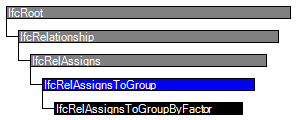Natural language names
 | Weist Gruppe zu - Relation |
 | Rel Assigns To Group |
 | Assignation à groupe |
 | Weist Gruppe zu - Relation |
 | Rel Assigns To Group |
 | Assignation à groupe |
| Item | SPF | XML | Change | Description | IFC2x3 to IFC4 |
|---|---|---|---|---|
| IfcRelAssignsToGroup | ||||
| OwnerHistory | MODIFIED | Instantiation changed to OPTIONAL. |
The objectified relationship IfcRelAssignsToGroup handles the assignment of object definitions (individual object occurrences as subtypes of IfcObject, and object types as subtypes of IfcTypeObject) to a group (subtypes of IfcGroup).
The relationship handles the assignment of group members to the group object. It allows for grouping arbitrary objects within a group, including other groups. The grouping relationship can be applied in a recursive manner. The resulting group is of type IfcGroup.
NOTE Examples of groups include zones as a grouping of spaces, distribution systems as a grouping of building service components, or structural analysis models as a grouping of structural items.
The inherited attribute RelatedObjects gives the references to the objects, which are the elements within the group. The RelatingGroup is the group that comprises all elements. The same object or object type can be included in zero, one or many groups. Grouping relationships are not hierarchical.
Informal Propositions:
HISTORY New entity in IFC1.0. It has been renamed from IfcRelGroups in IFC2x.
| # | Attribute | Type | Cardinality | Description | C |
|---|---|---|---|---|---|
| 7 | RelatingGroup | IfcGroup | [1:1] | Reference to group that contains all assigned group members. | X |
| Rule | Description |
|---|---|
| NoSelfReference | The instance to with the relation points shall not be contained in the set of RelatedObjects. |

| # | Attribute | Type | Cardinality | Description | C |
|---|---|---|---|---|---|
| IfcRoot | |||||
| 1 | GlobalId | IfcGloballyUniqueId | [1:1] | Assignment of a globally unique identifier within the entire software world. | X |
| 2 | OwnerHistory | IfcOwnerHistory | [0:1] |
Assignment of the information about the current ownership of that object, including owning actor, application, local identification and information captured about the recent changes of the object,
NOTE only the last modification in stored - either as addition, deletion or modification. | X |
| 3 | Name | IfcLabel | [0:1] | Optional name for use by the participating software systems or users. For some subtypes of IfcRoot the insertion of the Name attribute may be required. This would be enforced by a where rule. | X |
| 4 | Description | IfcText | [0:1] | Optional description, provided for exchanging informative comments. | X |
| IfcRelationship | |||||
| IfcRelAssigns | |||||
| 5 | RelatedObjects | IfcObjectDefinition | S[1:?] | Related objects, which are assigned to a single object. The type of the single (or relating) object is defined in the subtypes of IfcRelAssigns. | X |
| 6 | RelatedObjectsType | IfcObjectTypeEnum | [0:1] | Particular type of the assignment relationship. It can constrain the applicable object types, used within the role of RelatedObjects. | X |
| IfcRelAssignsToGroup | |||||
| 7 | RelatingGroup | IfcGroup | [1:1] | Reference to group that contains all assigned group members. | X |
| # | Concept | Model View |
|---|---|---|
| IfcRoot | ||
| Software Identity | Common Use Definitions | |
| Revision Control | Common Use Definitions | |
<xs:element name="IfcRelAssignsToGroup" type="ifc:IfcRelAssignsToGroup" substitutionGroup="ifc:IfcRelAssigns" nillable="true"/>
<xs:complexType name="IfcRelAssignsToGroup">
<xs:complexContent>
<xs:extension base="ifc:IfcRelAssigns">
<xs:sequence>
<xs:element name="RelatingGroup" type="ifc:IfcGroup" nillable="true"/>
</xs:sequence>
</xs:extension>
</xs:complexContent>
</xs:complexType>
ENTITY IfcRelAssignsToGroup
SUPERTYPE OF(IfcRelAssignsToGroupByFactor)
SUBTYPE OF (IfcRelAssigns);
RelatingGroup : IfcGroup;
WHERE
NoSelfReference : SIZEOF(QUERY(Temp <* SELF\IfcRelAssigns.RelatedObjects | RelatingGroup :=: Temp)) = 0;
END_ENTITY;